Updated May 2024
Alice Mary Jones was born on the 18th of September, 1894 at Winstitchen in Simonsbath. She was the eighth of nine children of John Charles Jones and Maria Jane Chappel/Chappell. William (Bill) Hobbs was the son of John Hobbs and was born around 1890.
Alice Jones and William (Bill) Hobbs married on the 10th of December 1914 at Exmoor Church in Simonsbath. In July 1915 their only child, David John Hobbs, was born at Hoar Oak Cottage.
It is believed, although unclear, that Bill Hobbs had joined the Royal North Devon Hussars at the start of the First World War. The photo below is believed to be of Bill at the North Hill Camp in Minehead but to date military records have been difficult to find which substantiate Bill’s military career. It may be that he enlisted but only for a short period of time as shepherding was a ‘starred occupation’ and Bill was protected, by his job, from needing to actually join up.
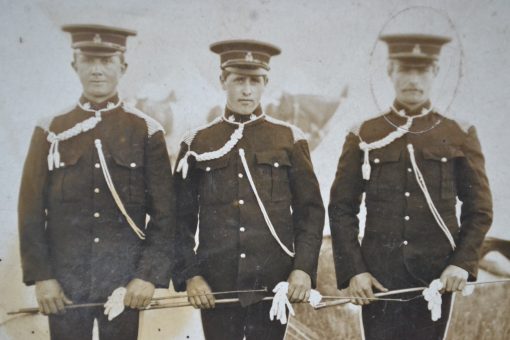
What is known for certain is that Alice’s younger brother, John Jones, had been helping out with shepherding at Hoar Oak Cottage but, as the war progressed and conscription began, John was sent to the Lynton Tribunal where his shepherd’s job was ‘unstarred’ and he was conscripted into the Army. His tribunal hearing was held at Lynton and reported in the May 25th, 1916, edition of the North Devon Journal. The image on the left shows that many men and businesses went before the Tribunal regarding conscriptions. John Jones hearing, close-up on the right below, seems to have been short and sweet.
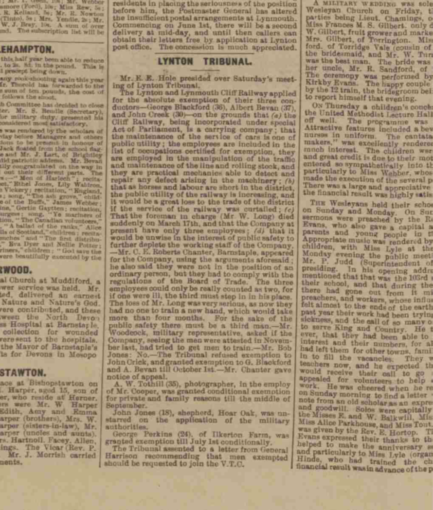
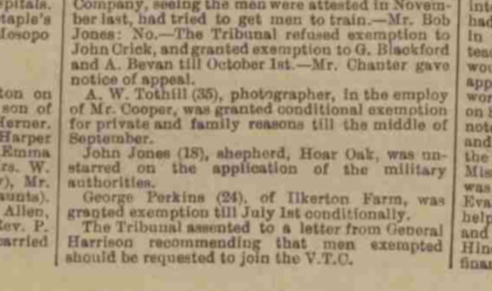
The photo below is known to be of Bill Hobbs but the date and place are unknown.
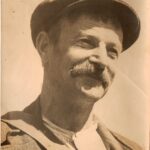
Bill was one of the many Hoar Oak shepherds employed by the Fortescue landowners who were allowed to cut peat turves in the Hoar Oak Valley as part of their employment entitlements. These flat, oblong turves of peat were the main source of fuel for cooking, heating, and boiling water at Hoar Oak Cottage. The photo below shows how the peat cutting was done using a ‘chest plough’.
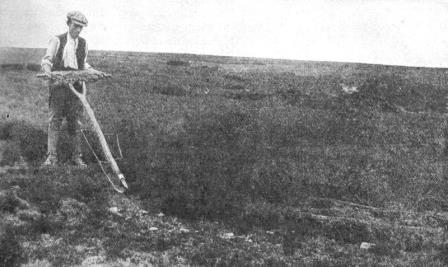
When the time came for Bill and Alice Hobbs’ son David to attend school, he went to board on a weekly basis with his Jones grandparents in Simonsbath. The photograph below, taken in 1922, shows young David at Simonsbath School – he is in the back row, far right, next to the young Assistant Teacher.
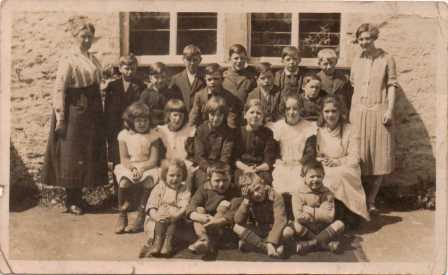
David was not the first in his family to attend Simonsbath School. The photo below, circa 1898, includes David’s mother Alice. The family know that Alice is in the photo but, unfortunately, it is not known which child she is.
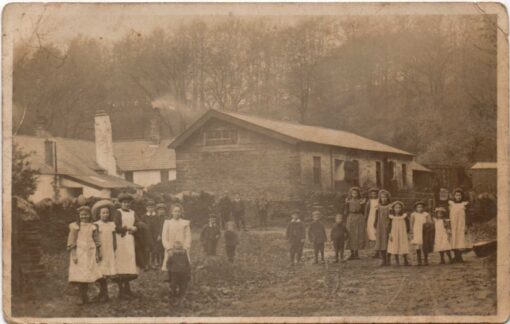
During the time that the Hobbs lived at Hoar Oak Cottage an attempt was made to keep the damp out of the cottage by covering the outside of the walls in black corrugated iron. The photo below shows Bill Hobbs outside of the cottage with, in the background, a roll of black corrugated iron ready to be fixed to the external walls.
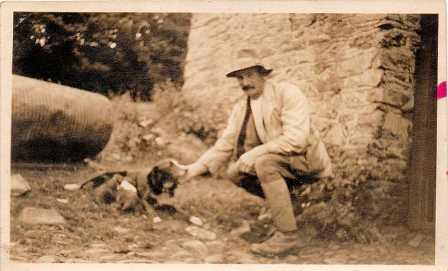
Bill, Alice and son David left Hoar Oak Cottage in the mid to late 1920s and went to live and work at Kipscombe Farm at Countisbury. The photo below left is of David and Mum Alice at Kipscombe Farm in 1934 and below right Bill Hobbs with his sheepdog Misty.
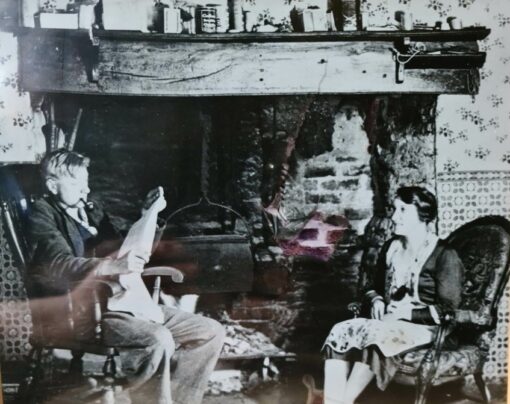
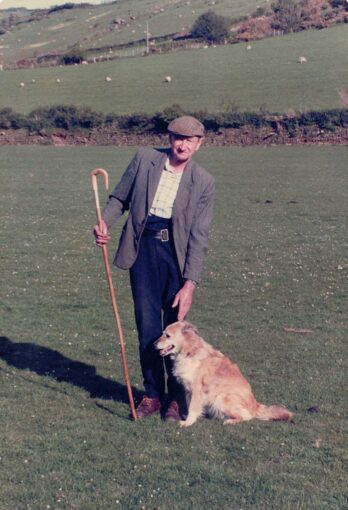
David Hobbs married Florence Rawle and they lived at Church Cottage, Countisbury and later at County Gate Cottage, Countisbury – now the Ramblers Rest Cafe. David held a lifelong interest in Hoar Oak Cottage and his son, Eric, explained how he often went back to visit his birthplace. The photo below shows him (middle) on just such a visit. His friends had taken him out in a Land Rover around ten years or so before he died in 2006. He loved to visit the cottage and we can see in the photo that David still has his shepherd’s crook to use as a walking stick.
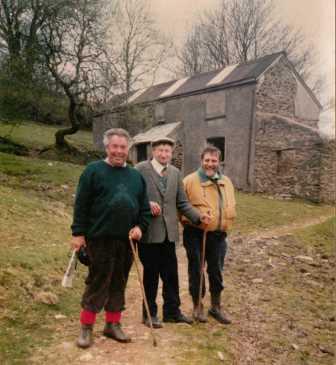
The photo below shows four generations of the Hobb’s family, all Exmoor shepherds. From left to right is David (born at Hoar Oak); Eric (David’s son as a young child); John (Bill’s father); and Bill Hobbs (once Hoar Oak shepherd.)
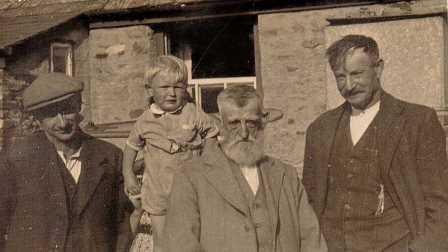
Thanks go to Eric Hobbs for his generosity in sharing so many photographs, memories and information about the Hobbs family at Hoar Oak Cottage. Eric was one of a group of descendants of Hoar Oak who took part in a picnic trip, in 2013, to visit the cottage and see the work being done to stabilise it as a heritage ruin. Here he is, below, enjoying a flask of tea.
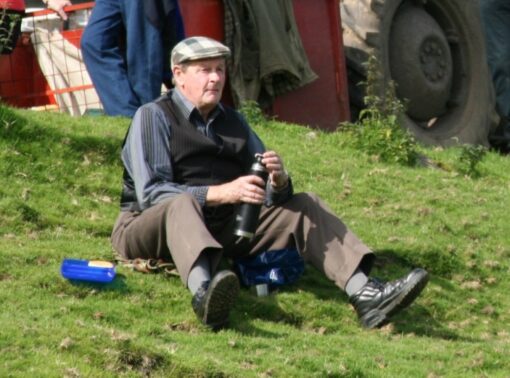
Eric passed away in 2016. His son Adam Hobs is a Trustee of the Friends of Hoar Oak Cottage and maintains the family’s interest in and commitment to the cottage and its history and heritage.
The chapter on Alice Hobbs nee Jones in “The Women of Hoar Oak Cottage – An Untold History” contains more details about this family and their life at Hoar Oak Cottage.
To get a copy go to:
- Books4Sale – hoaroak (hoaroakcottage.org)
- https://hoaroakcottage.org/books4sale/
- email: info@hoaroakcottage.org
